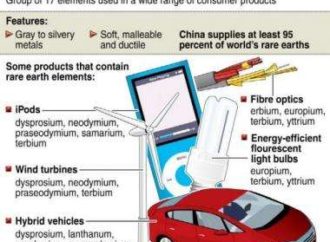Our national security and economic prosperity (including Colorado’s) depend on it
After falling behind foreign regimes, the U.S. may begin to develop and mine its own deposits of a whole host of minerals vital to our national security and economic prosperity.
In a December 20 executive order, President Trump directed federal agencies to develop a plan to break U.S. reliance on foreign sources for critical minerals necessary in almost every modern electronic device from our smart phones to strategic weapons systems.
The President stated the problem in his EO, “The United States is heavily reliant on imports of certain mineral commodities that are vital to the Nation’s security and economic prosperity. This dependency of the United States on foreign sources creates a strategic vulnerability for both its economy and military…”
Critical minerals
Critical minerals are minerals, including rare earth elements (REE), that are crucial to our economic and military strength and whose supply is vulnerable to disruption due to geopolitics, natural disasters or other events, even litigation.
These minerals are part of our everyday lives, in everything from smart phones, to wind turbines, to alternative vehicle car batteries, to medical equipment, to military strategic weapons systems and more. It’s impossible to maintain our standard of living without them.
The executive order comes on the heels of a recently released Department of Interior (DOI) report, led by the U.S. Geological Survey (USGS), that studied 23 critical minerals and found, “The United States is currently 100 percent reliant on foreign sources for 20 mineral commodities and imports the majority of its supply of more than 50 mineral commodities.”
In a DOI press release, Senate Energy and Natural Resources Committee Chairman Lisa Murkowski (R-AK) reiterated US vulnerability saying, “Our nation’s growing dependence on foreign minerals is a distinct threat to our economy, our national defense, and our international competitiveness.”
U.S. self interest versus unpredictable regimes
The President’s executive order directs Secretary of Interior Ryan Zinke to publish, within 180 days, an updated critical minerals list including mapping domestic deposits and to work with other federal agencies to develop a strategy to reduce U.S. dependence on imports and to expand private-sector exploration and production.
This is hugely important because in the not so distant past, the U.S. produced and processed enough of these minerals for its own use. But that has changed, in part, due to the proliferation of critical element dependent high tech devices and environmental regulations surrounding domestic production.
Over the last two decades, the U.S. has gotten further behind while other countries – not always friendly to the U.S. – have lured investment dollars to develop their own critical mineral resources for export.
Furthermore, the Massachusetts Institute of Technology reported that some nations willing to process their deposit do so at the expense of environmental and worker safeguards:
In places (such as the Democratic Republic of the Congo) where mining is often run by violent militias, a multitude of human rights violations are associated with rare mineral mines. Workers are forced to work in unsafe and unhealthy conditions.
Unregulated mining and refining also lead to environmental hazards along every step of the supply chain.
Right now, China controls roughly 95 percent of the world’s supply of some critical minerals. If U.S. manufacturers want reliable access to many critical minerals, the Chinese require companies to locate manufacturing facilities in China.
In 2012, then President Barak Obama along with the Japanese government and the European Union filed a complaint with the World Trade Organization (WTO) against China for reducing REE exports and “not playing by the rules.” In 2014, the WTO decided in favor of the U.S. and others against China.
But a legal victory didn’t solve the problem of being dependent upon unpredictable regimes – including the Congo and Russia – for resources that are absolutely vital to our national security and economic prosperity, and it still leaves the U.S. in an incredibly weak and vulnerable position.
That’s not a place in which the President wants Americans to be, nor should Americans want to be there.
Developing our own resources not only alleviates national security, environmental, and human rights concerns but also helps the U.S. economy by putting Americans to work in the development, mining, and processing of these critical elements.
Colorado should thank the President
Coloradans, especially Democratic gubernatorial candidates Jared Polis and Mike Johnston, should thank the President for his forward thinking. Both Polis and Johnston have pledged electricity from 100 percent renewable sources by 2040. Without a reliable domestic supply of these critical elements, Russia and China would have the ability to hold the Colorado economy hostage.
The 100 by 2040 plan already has a very high $45 billion price tag. Allowing other nations to have control via critical minerals could be economically disastrous.
Further, the USGS report identified Colorado deposits of some of these critical elements. Encouraging private sector development of these deposits will create jobs and expand Colorado’s economy.
Promise kept
This recent executive order is in line with the President’s campaign theme. As I wrote in The Hill earlier this year:
Trump is a results-driven businessman. Under his administration, with its renewed sense of optimism and faith in the American entrepreneurial spirit, the president expects Americans to show the world that we can develop our natural resources responsibly, produce our own energy, create jobs, get our economy growing, and be excellent stewards of our environment.
We can have it all.
Consider this recent executive order another example of a campaign promise kept.








